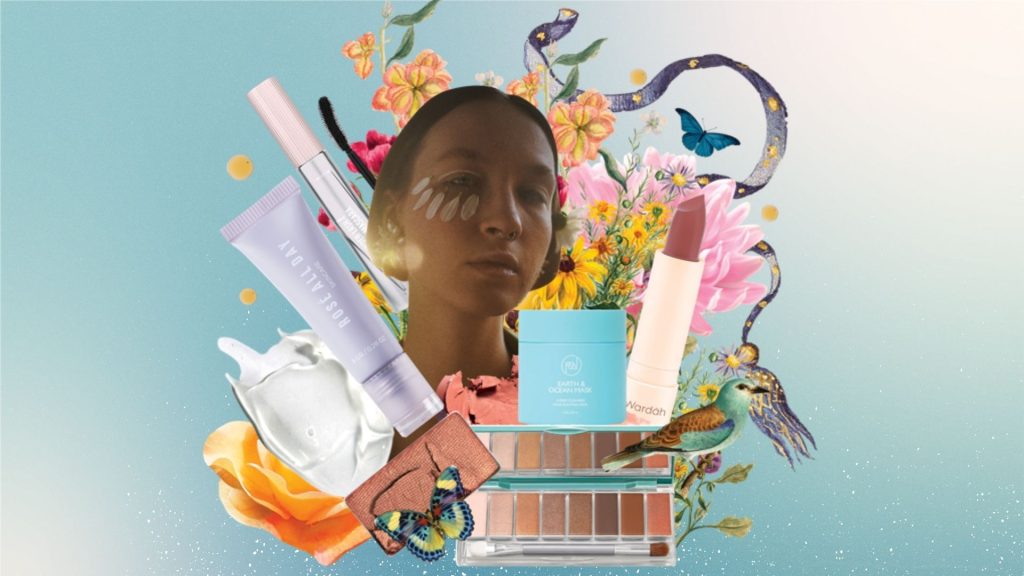
Any beauty obsessive worth their salt is familiar with the terms ‘clean beauty’ and ‘sustainable beauty’. That list goes on, really. Another up-and-coming category is looming upon us: halal beauty.
While the halal label is synonymous with the F&B industry, the fashion and beauty worlds are not exempt from such scrutiny. Articles of clothing made of pigskin are strictly forbidden for Muslims, requiring specific ingredients and a regimented ritual to cleanse oneself. For the uninitiated, halal-compliant products refer to items that are formulated without alcohol and most animal byproducts. Beyond that, it also means that the production adheres to a set standard. As Islam is emphatically against animal cruelty, products that carry this stamp are automatically cruelty-free.
The Clean/Halal Contrast
Is this just another ploy? It’s a resounding no. Just as vegan beauty is catering to a market that’s against the use of animal-derived ingredients and how cruelty-free beauty is part of the animal rights crusade, halal beauty is here to accommodate the needs of Muslim clientele—though it’s not exclusively for Muslims. Unlike clean beauty, the halal beauty segment is strictly regulated, with government administration’s involvement in some cases.
“The fundamental problem with clean beauty is that it makes you rule out ingredients and products based on the potential dangers without considering your exposure […]. It’s like never drinking water because you’re scared of drowning,” writes Australian cosmetic chemist Dr Michelle Wong.

Lindsay Dahl, former senior VP at Beautycounter says, “There are consequences for companies who mislabel, but because the FDA (the US Food and Drugs Administration) has not defined terms like ‘natural’ and ‘clean’ for personal products, there aren’t regulatory actions taken against companies.”
As far as halal beauty is concerned, as long as the ingredients are deemed good for you (and free of prohibited compounds), it’s good to go. The next challenge is finding facilities and suppliers that are also halal-compliant and certified—and those are few and far between. Speaking to Cosmetics Design Asia, Dr Alain Khaiat, president of Seers Consulting, highlights the fact that it’s an uphill battle across the board. “Small local companies may have issues in getting their suppliers to certify the ingredients […]. The sheer number of products is going to be a hurdle. For international companies, raw material suppliers, getting all the requirements in different countries is a huge task.”
A Different Perspective on Inclusivity
But that doesn’t mean there are no players in this field. Look to Indonesia, and you will find that locally found halal beauty brands are thriving, amassing retail success. Wardah has already gained international success; Esqa is sold at Sephora Indonesia; and Somethinc has a comprehensive assortment of skincare, body care, and colour cosmetics.
To the people behind brands with this ethos, it’s not only about breaking new ground; it’s also about inclusivity. In the present climate, when we think of inclusivity, the mind automatically goes to complexion shade ranges (think: the Fenty 40). But the term can be more than that. There is space made for pregnant individuals, those battling eczema, and many more—all done without excluding those outside the categories—so addressing the needs of the halal-compliant is just another facet of inclusivity. To those devoted to the religion, it’s not mere preference; it’s an obligation. Muslims make up more than a quarter of the human population, so it makes sense that the US$400 billion industry is to engage with this subset of customers.
Although the numbers are mostly concentrated in the South and Southeast Asian regions, Western countries have begun to recognise the growing interest in halal beauty. Farsali, Nails Inc, and Orly are already at the forefront of this venture, with more following suit. “It feels incredible to be able to provide skincare to my own community,” admits Jordan Karim, founder of American halal beauty brand Flora & Noor in an Allure interview.
“Post 9/11, my community faced the ugliness of Islamophobia. But we have so many beautiful elements such as sisterhood, sustainability, and more. I wanted to create a brand that honours and elevates those roots,” says Minara El-Rahman, co-founder of Mora Cosmetics, to Forbes.
Will a New Dawn Arrive?
The Insight Partners notes that by 2027, the halal beauty market is projected to be worth US$79 million by 2028. As a whole, the beauty industry would need coordinated efforts to expand the category to its full potential. Under this banner, customers who are looking for cruelty-free, clean, and sometimes even vegan solutions could easily turn to halal beauty.
It’s more than just about one’s faith. For the customers, it’s about being able to go about their day like everyone else, unencumbered.
